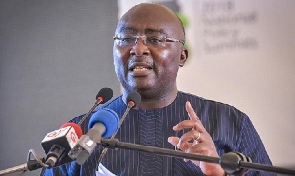Business News of Saturday, 7 May 2022
Source: ghanaiantimes.com.gh
Vice President, Dr Mahamudu Bawumia, has called on internal auditors to take advantage of government’s digitalisation drive to expeditiously identify risks and control weaknesses in public institutions and provide timely recommendations to enhance decision making.
He explained that, as internal auditors in a digitalised economy, their ability to provide independent assurance that public sector institutions’ risk management, governance and internal control processes were operating effectively depended largely on their adoption of digital technology.
He, therefore, advised boards and heads of institutions, both in the private and public sector, to provide the necessary training and Information Technology (IT) infrastructure to enable internal auditors add value in the digitalised environment.
The Vice President was speaking in Accra yesterday at this year’s Annual National Conference of the Institute of Internal Auditors (IIA) Ghana.
It was held on the theme “Elevating Impact in a Digitalised Economy.”
Dr Bawumia stated that, as part of attempts to deal with the menace of bribery and corruption in the public sector, the government had focused on the deployment of technology and digitalisation as an anti-corruption strategy.
One key attribute of a digitalised economy, he said, was the transparency it brings to processes, impacts, and failures for both government and the citizenry to see.
This, the Vice President noted enabled internal auditors to provide the government with independent impact assessments on the implementation of interventions in the digital economy to build public confidence, drive adoption and inform future policy interventions.
Due to the critical role of internal auditors in Public Financial Management (PFM) and in protecting the country’s scarce resources, he said practitioners were expected to evolve to meet current demands.
“The Internal Audit profession has evolved over the years. The techniques of internal auditing have changed from a reactive and control based form to a more proactive and risk based approach.”
“This enables the internal auditor to anticipate risks and opportunities and provide assurance, advice and insight where most needed,” Dr Bawumia added.
Citing the fight against corruption as an example, he said it could not be won by adopting the old-aged tactics of firefighting and called for the adoption of digitalisation to ensure transparency and efficiency.
Already, he indicated that government’s digitalisation drive was yielding the desired results including efficient public service delivery by all Ministries, Departments and Agencies on the Ghana.gov portal, combatting corruption by removing the middle-man and “ghost names” in many transactions, bringing more Ghanaians into the formal sector, and driving domestic revenue mobilisation, among others.
The Vice President said the next step in the country’s digitalisation process was to leverage the derived data to inform socio-economic policies and interventions to further national development.
The Director-General of the Ghana Audit Service, Johnson AkuamoahAseidu, in a speech read on his behalf, reiterated the importance of internal and external auditors working collaboratively to fight against breaches of the law and also support each other to build the necessary capacities to use computerised tools to realise the desired benefits.
The Chairman of the Public Account Committee (PAC) of Parliament, James KlutseAvedzi urged internal auditors to work towards reducing or ending infractions in the use of public funds adding the passage of the Internal Auditors Bill, which was currently under consideration, would strengthen internal auditors to effectively carry out their duties.
Chairman of the African Federation of Institute of Internal Auditors, Emmanuel Johannes, called for the introduction of effective legislation to remove impediments in the practice of internal audit for enhanced accountability and effective use of resources.
The president of the IIA, Ghana, HarrietAkuaKarikari said the month of May had been set aside by the IIA Global as International Internal Audit Awareness Month to raise awareness of the internal audit profession and its value, dispel misperceptions of the profession, and to enhance the business community’s knowledge of the essential role Internal Audit plays in strong organisational governance
 Kanawu Radio number 1 news portal
Kanawu Radio number 1 news portal

